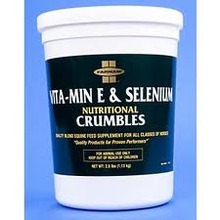A recent study by researchers at the Western College of Veterinary Medicine addressed the importance of selenium in the diet of brood mares.

Selenium to protect foal's immune system
Selenium is transferred to the foal through the placenta before birth and in mare's milk after the foal is born, and protects the foal's immune system.
Selenium is important in immune function. The mineral is transferred to the foal through the placenta before birth and in mare’s milk after the foal is born. Researchers at the Western College of Veterinary Medicine designed a study to measure the effect of mares’ consumption of organic or inorganic forms of selenium on levels of the mineral found in mares and foals.
In order for foals to have the best protection in their early months of life, broodmares should have adequate selenium levels in their ration throughout pregnancy. Two groups of Standardbred mares were fed identical diets containing selenium-deficient forage for two months before foaling and a month after foaling. Mares in the groups were supplemented with selenium from either an organic or an inorganic source, and selenium levels in blood from mares and foals and milk from mares were measured.
Results showed that selenium levels in blood, colostrum, and milk did not differ in mares regardless of type of selenium source. However, foals born to mares supplemented with organic selenium had blood selenium concentrations that were 170% higher at one month of age than foals whose dams consumed the inorganic selenium. The researchers interpreted this difference to mean that transplacental passage of selenium may have been greater for mares receiving the organic form of selenium.
Testing the foals for immunoglobulin G showed equal concentrations for both groups. Relative gene expression was increased in three immune parameters—interleukin-2, tumor necrosis factor-alpha, and interferon gamma—in foals from dams that had been supplemented with organic selenium. This indicates these foals would have an enhanced cellular immune response compared to foals whose dams did not receive organic selenium.
In order for foals to have the best protection in their early months of life, it is advisable to be sure broodmares have adequate selenium levels in their ration throughout pregnancy. Broodmare managers should consult an equine nutritionist if they have questions about providing adequate intake of selenium, especially in areas of the country where soil and forage selenium levels are naturally low.
